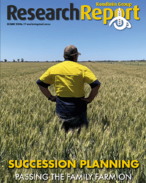This article is 3 years old. Images might not display.
The positive forecast is from Rabobank, in its latest Australian Agribusiness Outlook for 2022 report.
Titled ‘Making Hay While the Sun Shines', the report describes 2021 as a stellar year.
Last year saw high to record-high agricultural commodity prices and production volumes reaching record levels in some Australian commodities - which represented a continued recovery from the crippling 2017-2019 drought and had positioned Australian agriculture for a strong year ahead.
"Australia's second year of great pricing and mostly exceptional production conditions in 2021 means the Australian agriculture industry is well placed to take on the challenges of 2022," the report said.
It also noted that industry can prepare for the time when the sun is not shining so brightly in its favour.
RaboResearch senior commodities analyst, Cheryl Kalisch Gordon, said while there will be some pressure on farming margins in 2022 compared with 2021 - with some heat forecast to come out of a range of commodity prices, a mixed production outlook and supply chain challenges - another favourable year was expected for Australian agriculture.
Rabobank expects the Australian dollar to only gain a little over the year and remain near its five-year average.
Dr Kalisch Gordon said 2021 had been a "once in a blue moon" year for Australia's agricultural sector, with very strong prices resulting from "hardship globally", and with the high pricing coinciding with "favourable to very favourable Australian production conditions again".
"There was a combination of drought and adverse weather in key cropping regions around the world, strong stockpiling demand in the face of potential food shortages along with Covid-induced labour shortages which impacted intensively-produced agri products and transport," she said.
While the outlook for 2022 is positive, the bank expects the year ahead will bring "less pronounced opportunities" for Australian agriculture.
"We start 2022 with the Australian food supply chain under unprecedented pressure, supply chain disruption and bottlenecks being felt across the board - from access to inputs at the farm level through to consumers accessing food on supermarket shelves," Dr Kalisch Gordon said.






















